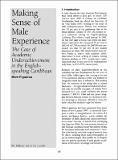| dc.contributor.author | Figueroa, Mark | en |
| dc.date.accessioned | 2016-02-01T14:44:15Z | |
| dc.date.available | 2016-02-01T14:44:15Z | |
| dc.date.issued | 01/04/2000 | en |
| dc.identifier.citation | Figueroa, M. (2000) Making Sense of Male Experience . IDS Bulletin 31(2): 68-74 | en |
| dc.identifier.issn | 1759-5436 | en |
| dc.identifier.uri | https://opendocs.ids.ac.uk/opendocs/handle/20.500.12413/8801 | |
| dc.description.abstract | Summaries During the twentieth century gender achievement in education has undergone a major transformation in the English?speaking Caribbean. Males are now the underachievers on global indicators, especially at the higher levels of the system. Yet males still overachieve in many fields where they have traditionally dominated. Although females' achievement in formerly male dominated areas gets a lot of attention, the failure of males to make any headway in fields traditionally dominated by females has been ignored. The current situation is best understood as differential gender achievement connected to an underlying historic male privileging rather than male underachiement due to some form of male marginalization. This proposition is explored drawing on a wide range of Caribbean research. A dynamic analysis is presented on how socio?economic change has impacted on academic achievement through factors operating at the level of the household and community, in school and at the workplace. Implications for policy are also discussed indicating the different approach adopted by the competing perspectives on gender and educational achievement. | en |
| dc.format.extent | 7 | en |
| dc.publisher | Institute of Development Studies | en |
| dc.relation.ispartofseries | IDS Bulletin Vol. 31 Nos. 2 | en |
| dc.rights.uri | http://www.ids.ac.uk/files/dmfile/IDSOpenDocsStandardTermsOfUse.pdf | en |
| dc.title | Making Sense of Male Experience | en |
| dc.type | Article | en |
| dc.rights.holder | © 2000 Institue of Development Studies | en |
| dc.identifier.doi | 10.1111/j.1759-5436.2000.mp31002009.x | en |

